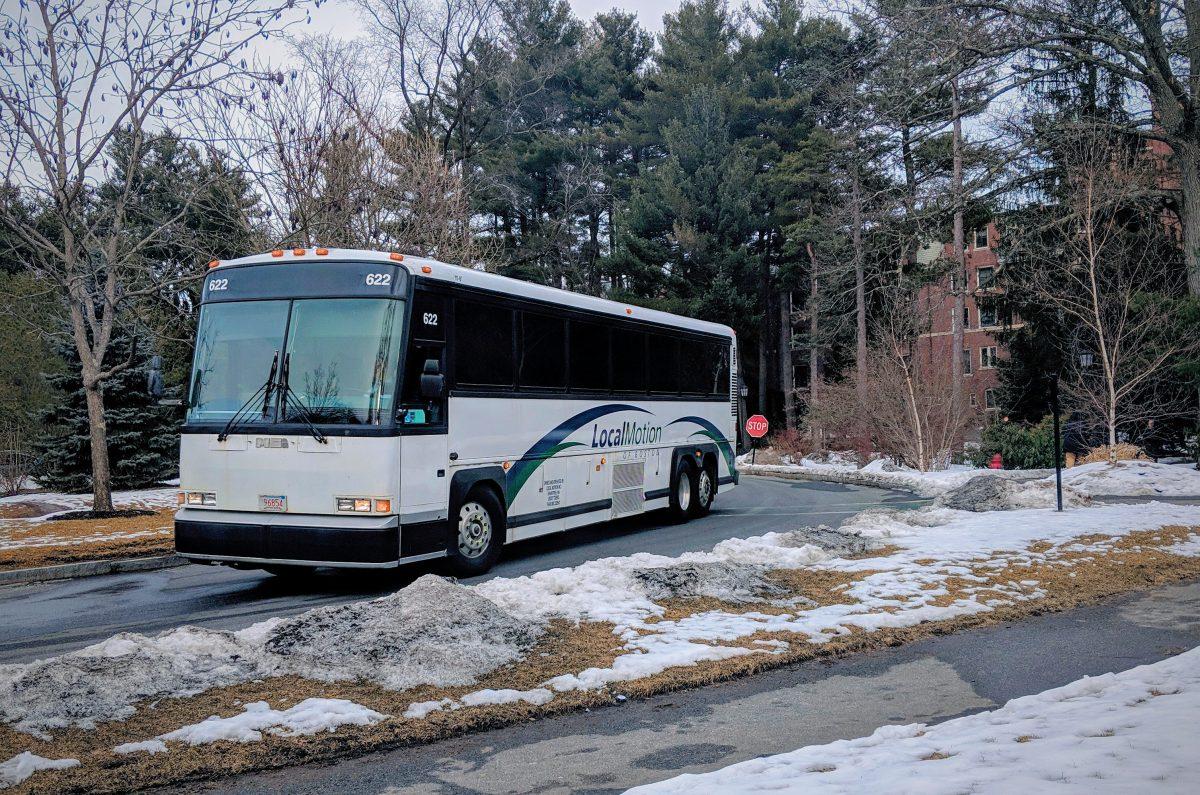On Feb. 25, Peter Eastment, director of faculty housing and transportation, and Bob Bassill, a representative from Local Motion, attended Senate to address student concerns regarding transportation. Local Motion, a Boston-based charter bus service which entered into a contract with Wellesley last fall, has provided transportation for students since the Peter Pan bus lines contract was terminated at the beginning of the academic year.
“Transportation services are important for academic and social purposes,” Eastment began. “[I understand] students are paying tuition to be able to go to MIT (Massachusetts Institute of Technology) and take a class or go into Boston on the weekends, and so we need to make sure we uphold these obligations.”
Sara Sanson Hernandez ’21, college government (CG) secretary treasurer, sent a Google Form to the student body in order to determine what students were interested in learning about Wellesley’s transportation policy with Local Motion. The top five issues of concern were having buses come later than 1:50 a.m. on Fridays and Saturdays, fixing the token machines or getting a new payment system, lowering or eliminating the bus fare on weekends, getting refunds when buses are too full or break down and introducing better monitoring of buses through the Local Motion app. Eastment and Bassill addressed all five concerns during their 25 minute presentation.
Eastment and Bassill first addressed the concern of late bus arrivals, particularly those occurring on weekend evenings. Bassill spoke first, saying, “We’re having a hard time recruiting drivers to work these late shifts, and we don’t want to compromise the safety of students, drivers and the community.” Currently, Massachusetts law restricts the number of consecutive hours a driver can operate a moving vehicle. In accordance with these laws, Local Motion drivers cannot drive for more than eight consecutive hours, and if they do, they are required to have an eight hour rest period before driving again. Bassill suggested that many of the drivers avoid signing up for late night shifts, because it interferes with their work schedules in following days.
However, the problem of late arrivals does not affect a large proportion of the student body. Eliza Zizka ’22, a frequent Local Motion rider, has never had a problem with the service, though she knows of people who have. “I had two different friends who were stranded in Boston because it never came. It was obviously a big inconvenience both personally and logistically. But personally, I have not experienced any problems with the bus service. So I guess I’m lucky in that sense.”
Next, Eastment and Bassill addressed student concerns about the unreliable token machines located in the Lulu Chow Wang Campus Center and Stone Davis. Since the $3 tokens are necessary for off-campus transportation on the weekends, students suggested on the Google Form sent out by CG that the payment method be changed to something more reliable. In response to these concerns, Eastment stated that a representative from Foley Vending, the company responsible for all of Wellesley’s vending machines, was sent to the College to examine them. “The technician who looked at the machines deemed that they were in good condition and would be repaired as soon as possible,” said Eastment.
The third concern Eastment and Bassill addressed was the expense associated with bus tokens. Although Exchange buses are free during the weekdays, Senate bus tokens cost $3 during the weekends, making a round trip six dollars. According to Eastment, “These transportation services [as a whole] are incredibly expensive services to operate … I manage seven different transportation services for the College, but that alone costs over $1 million for the College.”
Eastment uses the cost of the bus tickets, tokens and punch passes to offset the heavy expense of operating a bus system. “The sale of tickets, tokens and punch bases typically comes in at a little over $100,000 per year and it helps to defray some of the transportation costs. Fare price has not changed in many years. I try to be very generous by giving away tokens or tickets in raffles or auctions.”
Eastment and Bassill then discussed the issue of student refunds, particularly when buses are full or broken down. A student who attended the meeting brought up that sometimes, buses do not arrive or break down during their trips. Bassill responded to this by revealing that Local Motion cannot reimburse students that are left behind when buses are full or during mechanical breakdowns. Bassill stated that contractually, Local Motion is not required to reimburse students because that’s a lot of individual liability. However, Bassill did state that Local Motion does have an hour and 20 minutes to send another bus or find another way to rectify the problem.
In the last few minutes of the presentation, Eastment and Bassill opened up the floor for questions from audience members. Sydney Pierce ’20 suggested offering students on financial aid discounted bus tokens, asking, “Has Student Financial Services ever considered subsidizing the cost of bus tokens for students on financial aid?” Eastment suggested that this was a good idea, and said he would look further into this.
Illetze Poras ’19, Schneider Board of Governors (SBOG) DOOCA, asked if it was possible to establish an electronic punch pass system. She suggested that students are usually more active on their mobile devices and seldom carry paper tickets or tokens. Bassill encouraged members of the audience to download the Local Motion app, while Eastment suggested that this was a good idea.
As the session ended, Eastment took the time to thank a group of students who had assisted with transportation issues over the past semester. Eastment thanked Hannah Fernley, who interviewed bus companies, Lily Moore, who created the Wellesley Transportation Updates Facebook page, Celine Christory ’21, who initiated a petition at the beginning of the semester to address transportation issues, and Vienna Thomas ‘20, who served on the College’s Transportation Advisory Committee. “Without the dedication of these students, we could not have made the transition from Peter Pan to Local Motion possible.”






